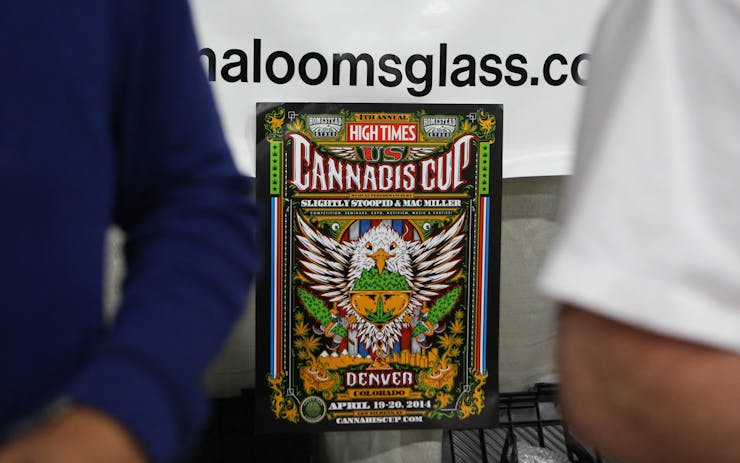Editor’s Note: This article has been updated to reflect new information.
The Las Vegas Cannabis Cup scheduled for this weekend, March 4-5, may take place as planned–but there may not be any cannabis there.
After facing a possible shutdown by federal authorities, the Cup’s organizer, High Times, has decided that the event will proceed as planned. Vendors, guests, performers and attendees, according to a High Times news release, “are advised to comply with all local, state, and federal laws regarding the use and distribution of cannabis and cannabis related products.”
“In order for the cannabis industry to continue to earn legitimacy and social acceptance,” the news release continued, “we understand that rules and laws need to be abided.”
Nevada voted to legalize the adult use of cannabis last November, but this particular conflict grew out of the location of the Cup—on tribal land about an hour’s drive from the Las Vegas Strip.
Organizers were apparently under the impression that a Department of Justice guideline would protect the event from federal interference. Federal prosecutors now call that “an incorrect interpretation of the Department’s position.”
The conflict stems from the event's location on Moapa Paiute tribal land.
The Reno Gazette-Journal reported Monday that US Attorney Daniel Bogden, whose jurisdiction includes all of Nevada, sent a letter on Feb. 16 to the Moapa Paiute Tribe reminding them that the transport, possession, use, and distribution of cannabis remains illegal under federal law. The letter, obtained by Gazette-Journal reporter Jenny Kane, informed the tribe that holding the Cannabis Cup on tribal land would be in violation of federal law.
The letter from Bogden reads, in part:
“I am informed that the tribal council is moving forward with the planned marijuana event referred to as the 2017 High Times Cannabis Cup because it is under the impression that the so-called ‘Cole Memorandum’ and subsequent memoranda from the Department of Justice permit marijuana use, possession and distribution on tribal lands when the state law also permits it. Unfortunately, this is an incorrect interpretation of the Department’s position on this issue.”
The Moapa River Reservation, site of this weekend’s festival, is located about 60 miles northeast of Las Vegas.
'As long as (marijuana) is not visible, we’re told it will be OK,' a tribe official said. So this may be the first dry Cup.
Tribal chairman Darren Daboda told the Gazette-Journal that Moapa Paiute officials have been working with the local US Attorney’s office to resolve the issue. “To us, we’re looking at it as utilizing our sovereignty,” Daboda told the newspaper. “As long as (marijuana) is not visible, we’re told it will be OK.”
That could be problematic, as the celebration and on-site consumption of cannabis has been a major feature of past Cannabis Cup events in Amsterdam, Denver, and San Bernardino, Calif. At the 2014 Cup in Denver, a number of companies offered free dab bars, and patrons consumed openly and legally within the confines of the event’s private outdoor space.
This isn’t the first conflict over cannabis on tribal land. In October 2014, Department of Justice Director Monty Wilkinson issued a guidance letter regarding federal marijuana enforcement in Indian Country. That letter, now known as the Wilkinson memo, did not make cannabis legal on tribal lands. Rather, it extended the enforcement guidance established by the earlier Cole memo while recognizing that “effective federal law enforcement in Indian Country, including marijuana enforcement, requires consultation with our tribal partners.”
That letter, now known as the Wilkinson memo, did not make cannabis legal on tribal lands. Rather, it extended the enforcement guidance established by the DOJ’s earlier Cole memo while recognizing that “effective federal law enforcement in Indian Country, including marijuana enforcement, requires consultation with our tribal partners.”
Each US Attorney calls the shots
Each of the 94 U.S. Attorneys exercises a wide range of discretion when it comes to cannabis enforcement both on and off tribal land. In Washington State, the Suquamish and Squaxin Island tribes have both opened adult-use cannabis stores on tribal land. Before doing so, though, those tribes entered into compacts with the State of Washington. Those compacts allow the tribes to retain sovereignty over their lands and laws, while aligning their cannabis regulations and taxing rates with those of the state. The local U.S. Attorney for Western Washington has not taken any action against those stores.
The same situation does not obtain elsewhere.
Some tribes are operating cannabis stores. Others can't even grow hemp.
In October 2015, federal agents raided lands belonging to the Menominee Indian Tribe of Wisconsin and destroyed the tribe’s industrial hemp crop. Earlier that year, the tribe voted to legalize the growing of non-psychoactive hemp. The crop was grown in a way that complied with the hemp provisions in the 2014 Farm Bill. Nonetheless, DEA agents showed up in late fall and destroyed the crop.
One month later, the Flandreau Santee Sioux tribe destroyed its own cannabis crop in a dramatic bonfire. The South Dakota tribe had grown the crop with the intention of selling it to adults visiting its new events center. Tribal officials got word of an impending raid, however, and ended the project before any federal intervention.
Many tribes have indicated an interest in growing cannabis on tribal land, as both an economic development project and as an expression of tribal sovereignty. But they must balance the potential economic gains and sovereignty issues with the potential for federal law enforcement intervention.
The Las Vegas Cannabis Cup is scheduled to be the first such event held on tribal land. Previous Cups on non-tribal land have also faced siting challenges. The 2016 Denver Cannabis Cup was cancelled due to county permitting issues. After an aborted attempt to move the event to Pueblo, the Cup was ultimately moved to the National Orange Show Events Center in San Bernardino, California.





